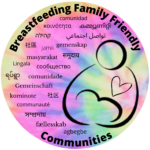Maternal Mental Health Awareness Month is quickly coming to a close. As I was cleaning up the emails in my inbox, I noticed a reminder email from Moms Rising to read their May call-to-action blogpost on supporting new moms. Seeing that email reminded me that, even though the month is almost over, the work to build awareness about maternal mental health continues.

#MaternalMHMatters
Postpartum depression is a serious maternal health concern. Untreated, postpartum depression can have devastating negative consequences for both mother and child, creating an environment that does not support the optimal development of the child or the mother’s well-being.1 Postpartum depression is not the “baby blues”, those feelings of worry or anxiety, sadness, and tiredness that are common in the short period of time after giving birth. Postpartum depression is more intense and lasts longer than the “baby blues.” While the “baby blues” feelings can go away on their own in a few days, postpartum depression will linger beyond a couple of days or become stronger, or the feelings might begin beyond the newborn stage.2
How can we support parents? In the Moms Rising blog post, How friends, family, teachers and other caregivers can support new mothers, Moms Rising author, Lina Acosta Sandaal MA, LMFT, dispels myths around perinatal and postpartum depression, cites important risk factors, and offers a list of ideas to support new mothers.
The post provides a call to action for all of us – friend, family member, school community, or neighbor. It also made me think about the role of the larger community, the breastfeeding family friendly community – healthcare, childcare, businesses, government – in supporting new mothers and their families. A welcoming, supportive community helps families to meet their breastfeeding goals or intentions. This is critical. When mothers are not depressed during pregnancy, the lowest risk of postpartum depression was found among women who had planned to breastfeed and who successfully breastfed their babies, and the highest risk for postpartum depression was found among women who had planned to breastfeed but were not able to breastfeed.3
Our communities also need to support mothers to seek help when they are experiencing symptoms of postpartum depression. Awareness of the symptoms is important. Equally important is awareness of the disparities around seeking and receiving postpartum support.4 There is work to be done to eliminate the inequities in support and to foster a welcoming and supportive community.
As we close Maternal Mental Health Month, let’s build on the momentum that this month engenders each year to promote the health and well-being of our mothers and children…our families.
Additional Reading:
From the National Institutes of Health (NIH):
From the National Institute of Child Health Quality (NICHQ)
From the Office of Women’s Health
References:
- 1 https://www.ncbi.nlm.nih.gov/pmc/articles/PMC6492376/
- 2 https://www.womenshealth.gov/mental-health/mental-health-conditions/postpartum-depression#references
- 3 https://pubmed.ncbi.nlm.nih.gov/25138629/
- 4https://www.medicalnewstoday.com/articles/postpartum-depression-in-women-of-color-more-work-needs-to-be-done#4
